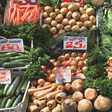 "The finding demonstrates for the first time that diallyl sulfide triggers a gene alteration in PhIP that may play a significant role in preventing cancer, notably breast cancer, induced by PhIP in well-done meats," the researchers reported.
"The finding demonstrates for the first time that diallyl sulfide triggers a gene alteration in PhIP that may play a significant role in preventing cancer, notably breast cancer, induced by PhIP in well-done meats," the researchers reported.All of these findings come on the heels of a sixth study, reported in last week's issue of The Lancet, which found that people with a genetic susceptibility to lung cancer could cut their risk for the disease by eating vegetables from the cabbage family.
"We found protective effects with at least weekly consumption of cruciferous vegetables," says lead researcher Paul Brennan of the International Agency for Research on Cancer in Lyon, France.
One expert says the results of the six studies are interesting. And while it may be some time before they have any practical applications for people, that should not stop us from adding more vegetables and fruits to our diet. "An extensive body of epidemiologic evidence suggests consistently, if not decisively, that generous consumption of fruits and vegetables is associated with reduced cancer risk," says Dr. David L. Katz, an associate professor of public health and director of the Prevention Research Center at Yale University School of Medicine.
Further study should provide "a clearer picture both of what foods reduce cancer risk, and how," Katz says. "Understanding in each of these areas will lead to new insights in the other. A refined ability to use diet in the prevention of cancer will ensue. "That is an exciting prospect," he adds. "But excitement about what may come should not distract from what is already in hand. Even with gaps in our knowledge, the case for increasing fruit and vegetable consumption to promote health and prevent disease -- cancer included -- is compelling and strong."
(The HealthDay Web site) 2005 HealthDay News

No comments:
Post a Comment